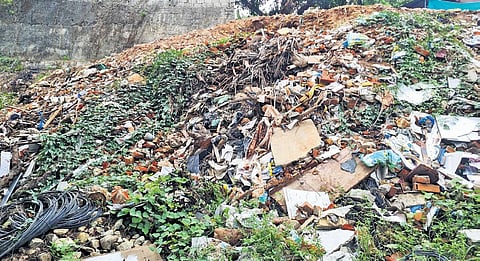

KOCHI: Kalamassery municipality has engaged Palakkad-based Fabbco Biocycle & BioProtein Technology for a temporary solution to its food waste management problem. The firm practises waste management using black soldier fly (BSF) larvae (scientific name: Hermetia illucens), which it claims has emerged as one of the most sustainable methods to handle biowaste. Managing Director Usman Adathiparambil talks to TNIE about the process involved and its viability.
What is the technology involved and how is it sustainable?
The technology we use here is very popular in Europe and is one of the emerging sustainable management methods for biowaste. The collected biowaste is first crushed in a machine, made into pulp and later enriched using microbes. This helps kill harmful pathogens. Through this process, the nutritional value of the substance is enhanced. Later, it is fed to the BSF larvae. This is one of the most sustainable techniques in waste management, as the waste is converted into food for the larvae.
The larvae of Hermetia illucens have been promoted as converters of organic waste but also as a nutritious feed source for chicken, pig breeding, and aquaculture. The value of nitrogen, phosphorus, and potassium (NPK) content produced from the residue of BSF larvae is approximately 3, which is of the highest quality.
How much waste can your Palakkad plant handle?
At present, we handle around 10–15 tonnes of food waste a day, feeding around 1 tonne of BSF larvae. The capacity at the existing facility can be scaled up to 50 tonnes a day. The plant is spread over 23,500 sqft on a two-acre-seven-cent plot.
How is the business viable?
We collect food waste from hotels in Kalamassery and Palarivattom, in Ernakulam, and areas around the plant, in Palakkad, Edappal, and Kuttipuram. The major source of income is the user fee. We collect Rs 5 for 1kg of waste from hotels. The concept is purely waste disposal. The method generates zero waste. The food waste is fed to the larvae, and the residue of the larvae is used as manure in agriculture and in the feed industry.
These larvae are available abundantly. Thanks to our climatic conditions, they do not require any additional modification, whereas, in foreign countries, they have to regulate the temperature for BSF larvae to be active. The business has huge potential, as it can provide a rich source of protein to the industry while treating food waste at the same time.
How did you tie-up with Kalamassery municipality?
We had approached the municipality with a complaint and they asked us to handle their food waste on a trial basis. The local body has entrusted us with food waste management on a temporary basis. We have agreed to collect 4-5 tonnes of food waste daily.
How did you end up with this method of waste management?
I used to run a cattle-feed business that introduced me to these larvae. Out of curiosity, I learned more about them and found that they are used in biowaste management in various countries. I decided to try out the process, as waste management was already an issue. With the help of two friends, who also partnered in the business, we set up the plant in 2015 and began our research.
The machines used are customised to our requirements, with a few parts imported from Europe. The biowaste issue in Kochi can be easily solved using this method; all it needs is a machine to convert food waste into pulp, high-quality imported feeding trays, tonnes of BSF larvae, and adequate land.